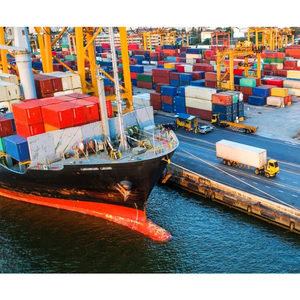Freight Rate Shipment Quote: Understanding the Basics and How to Get the Best Deal
Freight Quote the worldwide logistics and shipping industry, just about the most critical elements in planning any cargo movement is getting a LTL and FTL Freight Quote. Whether you are a business owner importing goods or even an individual relocating internationally, understanding how freight quotes work will save you time, money, and stress. What can be a Freight Rate Shipment Quote? A freight rate shipment quote can be an estimated cost given by a freight forwarder or carrier for transporting goods in one location to another. This quote typically includes charges for transportation, fuel, surcharges, customs clearance, insurance, as well as other logistical services.  There are very different types of freight, including: Air Freight – Ideal for fast and lightweight shipments. Sea Freight (Ocean Freight) – Cost-effective for big and heavy cargo. Road Freight – Suitable for domestic or cross-border land transportation. Rail Freight – Efficient for long-distance inland transport, specifically in bulk. Each mode possesses its own pricing factors and timelines. Key Components of a Freight Rate Quote To understand your quote and compare it effectively, pay attention to these components: Origin and Destination Charges be determined by the distance between your pickup and delivery locations, and whether ports, airports, or inland terminals could happen. Type and Volume of Cargo Costs vary based on whether your cargo is Less-than-Container Load (LCL), Full Container Load (FCL), palletized, or loose. Weight Most carriers charge determined by the chargeable weight, which is the higher of actual weight or volumetric weight. Service Type Port-to-port, door-to-port, or door-to-door services each include different cost implications. Customs and Duties A quote may include estimates for customs brokerage and import/export duties depending on the country of origin and destination. Surcharges These can include fuel surcharges, security fees, peak season charges, and currency adjustment factors. How to Request a Freight Rate Quote To receive an accurate quote, expect you'll provide: Pickup and delivery addresses Cargo description (type, weight, dimensions) Preferred mode of transport Shipping terms (Incoterms like FOB, CIF, EXW) Desired delivery date Special handling requirements (e.g., hazardous materials, temperature control) Tips for Getting the Best Freight Rate Plan in Advance Last-minute shipments cost more. Booking early offers you access to lower rates and options. Consolidate Shipments Grouping multiple smaller shipments into one larger load is able to reduce overall costs. Be Flexible with Timing Off-peak or deferred services will often be cheaper than express or urgent shipments. Use a Freight Forwarder They often negotiate better rates this can high level of business and still provide value-added services like documentation and insurance. Compare Multiple Quotes Don’t be satisfied with the first quote. Comparing multiple providers helps to ensure you're finding a competitive deal. A freight rate shipment quote is more than just a number—it’s expose estimate that reflects the complexity of moving goods across borders or continents. By comprehending the components involved and providing accurate shipment information, it is possible to secure essentially the most cost-effective and efficient solution on your shipping needs. Whether you’re a seasoned importer or a first-time shipper, finding the time to analyze and compare freight quotes can significantly impact your important thing.
There are very different types of freight, including: Air Freight – Ideal for fast and lightweight shipments. Sea Freight (Ocean Freight) – Cost-effective for big and heavy cargo. Road Freight – Suitable for domestic or cross-border land transportation. Rail Freight – Efficient for long-distance inland transport, specifically in bulk. Each mode possesses its own pricing factors and timelines. Key Components of a Freight Rate Quote To understand your quote and compare it effectively, pay attention to these components: Origin and Destination Charges be determined by the distance between your pickup and delivery locations, and whether ports, airports, or inland terminals could happen. Type and Volume of Cargo Costs vary based on whether your cargo is Less-than-Container Load (LCL), Full Container Load (FCL), palletized, or loose. Weight Most carriers charge determined by the chargeable weight, which is the higher of actual weight or volumetric weight. Service Type Port-to-port, door-to-port, or door-to-door services each include different cost implications. Customs and Duties A quote may include estimates for customs brokerage and import/export duties depending on the country of origin and destination. Surcharges These can include fuel surcharges, security fees, peak season charges, and currency adjustment factors. How to Request a Freight Rate Quote To receive an accurate quote, expect you'll provide: Pickup and delivery addresses Cargo description (type, weight, dimensions) Preferred mode of transport Shipping terms (Incoterms like FOB, CIF, EXW) Desired delivery date Special handling requirements (e.g., hazardous materials, temperature control) Tips for Getting the Best Freight Rate Plan in Advance Last-minute shipments cost more. Booking early offers you access to lower rates and options. Consolidate Shipments Grouping multiple smaller shipments into one larger load is able to reduce overall costs. Be Flexible with Timing Off-peak or deferred services will often be cheaper than express or urgent shipments. Use a Freight Forwarder They often negotiate better rates this can high level of business and still provide value-added services like documentation and insurance. Compare Multiple Quotes Don’t be satisfied with the first quote. Comparing multiple providers helps to ensure you're finding a competitive deal. A freight rate shipment quote is more than just a number—it’s expose estimate that reflects the complexity of moving goods across borders or continents. By comprehending the components involved and providing accurate shipment information, it is possible to secure essentially the most cost-effective and efficient solution on your shipping needs. Whether you’re a seasoned importer or a first-time shipper, finding the time to analyze and compare freight quotes can significantly impact your important thing.